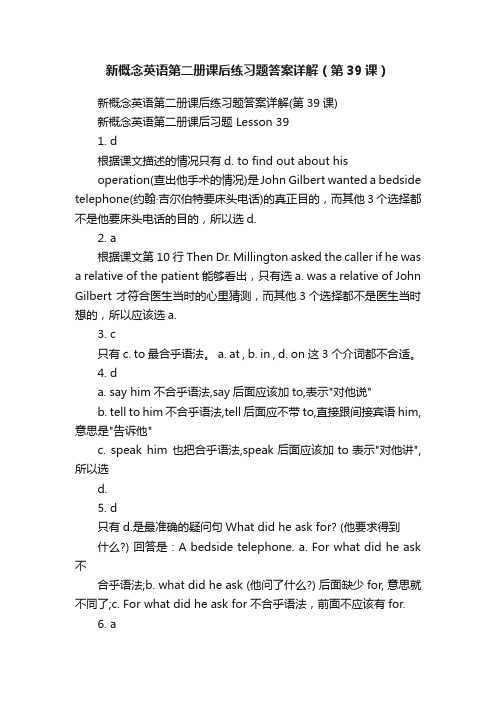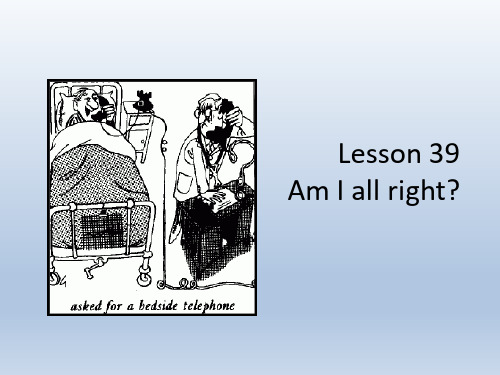新概念英语第二册第39课-Am I all right-
新概念英语第二册39课

1、人称的转变
1)直接引语中的第一人称随主句主语变 如: He said,“I am very sorry.” ——>He said that he was very sorry. 2)直接引语中的第二人称随主句谓语变 如: “You should be more careful next time,” my father told me. ——> My father told me that I should be more careful the next time.
2、时态的转换 直接引语改为间接引语时,主句中的谓语动词 如果是过去时,从句(即间接引语部分)的谓语动词在时态方 面要作相应的变化,变成过去时范畴的各种时态(实际也是宾 语从句的时态要求),变化如下:
直接引语 间接引语 一般现在时 一般过去时 一般过去时 过去完成时 现在进行时 过去进行时 现在完成时 过去完成时 过去完成时 过去完成时 过去进行时 过去进行时 一般将来时 过去将来时
3)地点状语:here变成there She said, “I won't come here any more.” ——> She said that she wouldn’t go there any more. 4)动词:come变成go,bring变成take 5、直接引语变间接引语,句子结构的变化 1)陈述句。用连词that引导,that在口语中常省略。主 句的谓语动词可直用接引语中的said, 也可用told来代替, 注意,可以说said that, said to sb. that, told sb. that, 不可直接说told that,
如: He asked me, “Will you go to the station with me to meet a friend of mine this afternoon?”
新概念二英语lesson39-Am-I-all-right我是否痊愈

T
3. When John was alone, he went to find the doctor himself.
F
4. The doctor told him that he would have to stay in hospital
for two more weeks.
T
5. One of John Gilbert’s relatives had telephoned the
6. Tom was surprised ______ she didn't know his father.
A. even though B. if
C. as
D. as if
7. I know everybody here ______ a girl.
A. not know
B. don't know C. except
Review
Lesson 38
1. Where did Harrison live before he returned to English? A. Paris B. Mediterranean C. England
2. What's the weather like in England? A. A lot of sunshine B. A lot of rain
1. be in hospital住院 2. refuse to do sth.
The following day, the patient asked for a bedside telephone. When he was alone, he telephoned the hospital exchange and asked for Doctor Millington.
新概念英语第二册课后练习题答案详解(第39课)

新概念英语第二册课后练习题答案详解(第39课)新概念英语第二册课后习题 Lesson 391. d根据课文描述的情况只有d. to find out about hisoperation(查出他手术的情况)是John Gilbert wanted a bedside telephone(约翰·吉尔伯特要床头电话)的真正目的,而其他3个选择都不是他要床头电话的目的,所以选d.2. a根据课文第10行Then Dr. Millington asked the caller if he was a relative of the patient 能够看出,只有选a. was a relative of John Gilbert 才符合医生当时的心里猜测,而其他3个选择都不是医生当时想的,所以应该选a.3. c只有c. to 最合乎语法。
a. at , b. in , d. on 这3个介词都不合适。
4. da. say him不合乎语法,say后面应该加to,表示"对他说"b. tell to him 不合乎语法,tell后面应不带to,直接跟间接宾语him,意思是"告诉他"c. speak him 也把合乎语法,speak后面应该加to表示"对他讲",所以选d.5. d只有d.是最准确的疑问句What did he ask for? (他要求得到什么?) 回答是:A bedside telephone. a. For what did he ask 不合乎语法;b. what did he ask (他问了什么?) 后面缺少for, 意思就不同了;c. For what did he ask for 不合乎语法,前面不应该有for.6. a只有选a. let him go(让他走)才能同前一句When will he be allowed to go home(他什么时候能够回家。
新概念英语第二册 课后答案 第三十九课

新概念英语第二册课后答案第三十九课新概念英语第二册课后答案第三十九课 Lesson 391. d根据课文描述的情况只有d. to find out about hisoperation(查出他手术的情况)是John Gilbert wanted a bedside telephone(约翰·吉尔伯特要床头电话)的真正目的,而其他3个选择都不是他要床头电话的目的,所以选d.2. a根据课文第10行Then Dr. Millington asked the caller if he was a relative of the patient 能够看出,只有选a. was a relative of John Gilbert 才符合医生当时的心里猜测,而其他3个选择都不是医生当时想的,所以应该选a.3. c只有c. to 最合乎语法。
a. at , b. in , d. on 这3个介词都不合适。
4. da. say him不合乎语法,say后面应该加to,表示"对他说"b. tell to him 不合乎语法,tell后面应不带to,直接跟间接宾语him,意思是"告诉他"c. speak him 也把合乎语法,speak后面应该加to表示"对他讲",所以选d.5. d只有d.是最准确的疑问句What did he ask for? (他要求得到什么?) 回答是:A bedside telephone. a. For what did he ask 不合乎语法;b. what did he ask (他问了什么?) 后面缺少for, 意思就不同了;c. For what did he ask for 不合乎语法,前面不应该有for.6. a只有选a. let him go(让他走)才能同前一句When will he be allowed to go home(他什么时候能够回家。
新概念英语第二册课后练习题答案详解(第39课)

新概念英语第二册课后练习题答案详解(第39课)新概念英语第二册课后练习题答案详解(第39课)新概念英语第二册课后习题 Lesson 391. d根据课文描述的情况只有d. to find out about hisoperation(查出他手术的情况)是John Gilbert wanted a bedside telephone(约翰·吉尔伯特要床头电话)的真正目的,而其他3个选择都不是他要床头电话的目的,所以选d.2. a根据课文第10行Then Dr. Millington asked the caller if he was a relative of the patient 能够看出,只有选a. was a relative of John Gilbert 才符合医生当时的心里猜测,而其他3个选择都不是医生当时想的,所以应该选a.3. c只有c. to 最合乎语法。
a. at , b. in , d. on 这3个介词都不合适。
4. da. say him不合乎语法,say后面应该加to,表示"对他说"b. tell to him 不合乎语法,tell后面应不带to,直接跟间接宾语him,意思是"告诉他"c. speak him 也把合乎语法,speak后面应该加to表示"对他讲",所以选d.5. d只有d.是最准确的疑问句What did he ask for? (他要求得到什么?) 回答是:A bedside telephone. a. For what did he ask 不合乎语法;b. what did he ask (他问了什么?) 后面缺少for, 意思就不同了;c. For what did he ask for 不合乎语法,前面不应该有for.6. a只有选a. let him go(让他走)才能同前一句When will he be allowed to go home(他什么时候能够回家。
新概念英语第二册Lesson 39 (PDF版课件 )

New words and expressions
• In exchange, you teach me how to clean.
GRAMMAR
Grammar
• 定义:当一个句子作宾语时,这个句子就 叫做宾语从句。
• 179 • 180页
Grammar
• 用法:在谓语动词、介词、动词不定式等 后面都可以接宾语从句。
Comprehension questions
• The doctor refused to, didn't he? • Yes, he did.
Comprehension questions
• What did the patient ask for the following day?
• For a bedside telephone.
• in hospital • 住院
Text
• The following day, the patient asked for a bedside telephone.
• asked for 请求,索要
Text
• He asked me for a meal and a glass of beer. • NCE2 Lesson6
operation n.
• the process of cutting into someone’s body to repair or remove a part that is damaged
• 手术
New words and expressions
• operation on • She’s going to need an operation on her ankle.
裕兴新概念英语第二册完美打印版笔记_第39课

Lesson 39 Am I all right? 我是否痊愈?单词operation n.手术operate V.1)操作,操纵(机器等),运作,运转( control,run) operate a machine操纵一台机器operate the lift开电梯例:This sewing machine doesn't operate properly.这台缝纫机不太好用了。
2)经营,管理(run, manage)operate a company经营一家公司例: The company operate ten factories.这家公司管理十个厂子。
The business operate in various counties.那家企业在许多国家都有业务。
3)动手术operate on sb for--为谁动手术例: The surgeon decided to operate on her for appendicitis(盲肠)promptly.这个外科医生决定立刻为她做盲肠手术physician 内科医生operation n.手术,运转,操作operation instruments 手术器械例:I had an operation on my heart../I underwent an operation on my heart.我做了一次心脏手术。
the operation of an old machine IH机器的运转bring into operation /put into operationvt.实施(法律,计划等),运作(机械等)come into operation V1.实施,开始运转例: The new rules will come into operation next month./The new rules will be put into operation next month. 新的规章制度下个月开始实施。
裕兴新概念英语第二册完美打印版笔记 - 第39课

裕兴新概念英语第二册完美打印版笔记 - 第39课Lesson 39 Am I all right? 我是否痊愈?单词operation n.手术 operate V.1)操作,操纵(机器等),运作,运转( control,run) operate a machine操纵一台机器 operate the lift开电梯例:This sewing machine doesn't operate properly. 这台缝纫机不太好用了。
2)经营,管理(run, manage) operate a company经营一家公司例: The company operate ten factories. 这家公司管理十个厂子。
The business operate in various counties. 那家企业在许多国家都有业务。
3)动手术operate on sb for--为谁动手术例 : The surgeon decided to operate on her for appendicitis(盲肠)promptly.这个外科医生决定立刻为她做盲肠手术 physician 内科医生operation n.手术,运转,操作 operation instruments 手术器械例:I had an operation on my heart.. /I underwent an operation on my heart. 我做了一次心脏手术。
the operation of an old machine IH机器的运转 bring into operation /putinto operation vt.实施(法律,计划等),运作(机械等) come into operation V1.实施,开始运转例: The new rules will come into operation next month./The new rules will be put into operation next month. 新的规章制度下个月开始实施。
- 1、下载文档前请自行甄别文档内容的完整性,平台不提供额外的编辑、内容补充、找答案等附加服务。
- 2、"仅部分预览"的文档,不可在线预览部分如存在完整性等问题,可反馈申请退款(可完整预览的文档不适用该条件!)。
- 3、如文档侵犯您的权益,请联系客服反馈,我们会尽快为您处理(人工客服工作时间:9:00-18:30)。
新概念英语第二册第39课:Am I all right?Why did Mr. Gilbert telephone Dr. MillingtonWhile John Gilbert was in hospital, he asked his doctor to tell him whether his operation had been successful, but the doctor refused to do so. The following day, the patient asked for a bedside telephone. When he was alone, he telephoned the hospital exchange and asked for Doctor Millington. When the doctor answered the phone, Mr. Gilbert said he was inquiring about a certain patient, a Mr. John Gilbert. He asked if Mr. Gilbert s operation had been successful and the doctor told him that it had been. He then asked when Mr. Gilbert would be allowed to go home and the doctor told him that he would have to stay in hospital for another two weeks. Then Dr. Millington asked the caller if he was a relative of the patient. No, the patient answered, I am Mr. John Gilbert.参考译文当约翰.吉尔伯特住院的时候,他问医生他的手术是否成功,但医生拒绝告诉他。
第二天,这位病人要了一部床头电话。
当房里只剩他一个人时,他接通了医院的交换台,要求与米灵顿医生讲话。
当这位医生接过电话时,吉尔伯特先生说他想询问一个病人的情况,是一位名叫约翰.吉尔伯特的先生。
他问吉尔伯特先生的手术中否成功,医生告诉他手术很成功。
然后他又问吉尔伯特先生什么时候可以回家,医生说他在医院还必须再住上两个星期。
之后,米灵顿医生问打电话的人是否是病人的亲属。
“不是,〞病人答复说,“我就是约翰.吉尔伯特先生。
〞New words and Expressions生词和短语operationn. 手术successfuladj. 成功的followingadj. 下一个patientn. 病人aloneadj. 单独的exchangen. 〔电话的〕交换台 inquirev. 询问,打听certainadj. 某个callern. 打电话的人relativen. 亲戚Lesson 39 自学导读First things first课文详注 Further notes on the text1.Am I all right?〔标题〕我是否痊愈?all right 在不同的上下文中会有不同的含义。
当指人的健康状况时,它可以表示“安然无恙的〞、“良好的〞:I was not very well last week, but I feel all right now.我上星期有点不舒服,不过我现在觉得好了。
2. he asked his doctor to tell him whether his operation had been successful, but the doctor refused to do so.他问医生他的手术是否成功,但医生拒绝告诉他。
whether引导的从句在句中作动词 tell 的直接宾语,是一个间接一般疑问句。
〔cf.本课语法〕so在这里为代词,代替前面的动词不定式〔在 to tell himwhether 〕。
它一般出现 believe, do, expect, hope, say, tell, think, appear等之后:Is it true that John has had an operation约翰真的动手术了吗I am afraid so./I believe so./I think so./It seem so.恐怕是真的。
/我相信是真的。
/我想是真的。
/看来是真的。
3.The following day, the patient asked for a bedside telephone. 第2天,这位病人要了一部床头电话。
〔1〕following 在这里相当于next,表示“紧接着的〞、“其次的〞。
〔2〕ask for 在这句话中表示“请求〞、“要求〔得到某个东西〕〞;在下一句话〔 asked for Doctor Millington〕中它表示“要求〔某人〕来〔接电话〕〞。
4. Mr.Gilbert said he was inquiring about a certain patient ,a Mr.John Gilbert.吉尔伯特先生说他想询问一个病人的情况,是一位名叫约翰吉尔伯特的先〔1〕certain 在这里没有“肯定的〞、“确实的〞等含义,而表示“某一〞、“某位〞,暗指说话者或说话对象可能对这人/这事不大清楚/熟悉,或所指的这个人身份不大清楚:Many years ago a certain doctor arrived in London.许多年以前,有某个医生来到了伦敦。
〔2〕在第6课的语法中,我们提到姓名前不加冠词。
但是,a/an有时可以用在称呼〔Mr.,Mrs.,Miss等〕前面,表示“我不认识的某某人〞:A Mr.Gilbert phoned and left a message for you.一位姓吉尔伯特的先生给您打来电话并留了言。
这种情况下,a通常与表示“某一〞的 certain 连用:A certain Mrs.Hart is waiting to see you.有位哈特夫人正等着见您。
5.He then asked when Mr.Gilbert would be allowed to go bome然后他又问吉尔伯特先生什么时候可以回家would be allowed 为被动语态用于过去将来时。
when引导的从句为间接疑问词疑问句。
〔cf.本课语法〕6.for another two weeks,又两个星期。
another 作为限定词表示“另一个〞、“再一个〞的时候,通常与可数的单数名词连用,不和复数形式连用;但是后面可以跟基数词/few+复数名词〔它们被当成一个整体〕:Do you need another cup of coffee你要不要再来一杯咖啡?I need another three driving lessons before my test.考试前我还需上3节驾驶课。
I need another few hours before I can finish my homework.我还需几个小时才能做完作业。
语法 Grammar in use间接引语:间接疑问句在第15课的语法中,我们学习了间接引语的根本形式和间接陈述句的用法〔包括时态变化等〕。
疑问句变为间接疑问句时有一些独特的规律。
首先引号和问号不再使用。
其次,直接疑问句中的倒装语序在转述疑问句里要复原为陈述句语序〔主语+动词〕。
同时,如有必要,还需改变时态。
〔1〕间接一般疑问句转述一般疑问句时必须使用if或 whether,不可省略。
助动词do/does和did在转述疑问句里消失了:Did he go home“他回家了吗〞She asked me if/whether he had gone home.她问我他是否已经回家了。
ask, want to know, wonder 等后面的if和 whether通常可以互换,但是whether表示的疑心程度比if稍大。
I wonder if/whether he s phoned the doctor.我不知道他是否给医生打电话了。
I asked if/whether he d phoned the doctor,but no one knew.我问(别人)他是否给大夫打过电话,但没人知道。
在表示两者挑一时更常用 whether:She asked me whether I wanted tea or coffee.她问我要茶还是要咖啡。
转述疑问句中带有or not时,通常用 whether引导:He wants to know whether or not we want dinner.他想知道我们想不想吃饭。
〔不能用if or not〕〔2〕间接疑问词疑问句在转述疑问词疑问句时,不加 whether或 if,通常用原来的疑问词。
有时可以将一般疑问句转述为间接疑问词疑问句:Will she arrive this evening她今天晚上会到吗She didn t tell me when she d arrive.她没有告诉我她何时到。
在针对主语提问的间接疑问句中,时态和情态助动词照常有变化,但语序保持不变:Who is in change here“这儿谁负责〞He wanted to know who was in charge there.他想知道那儿谁负责。
词汇学习 Word study1.exchange〔1〕vt.换,更换,调换〔指同类事物之间〕:If you don t like the colour of this dress, you can exchange the dress in the shop.你如果不喜欢这件衣服的颜色,你可以去商店换一件。
I want to exchange the red skirt for a blue one.我想把这条红裙子换成蓝色的。
〔2〕vt.交换,互换:I met Frank at a bus stop this afternoon and we exchanged a few words.我今天下午在一个公共汽车站碰见了弗兰克,我们聊了几句。
Did you exchange gifts after the party晚会结束后,你们交换礼物了吗?〔3〕n.电话交换台:He telephoned the hospital exchange and asked for Doctor Millington. 他挂通了医院的交换台,要求与米灵顿医生讲话。
